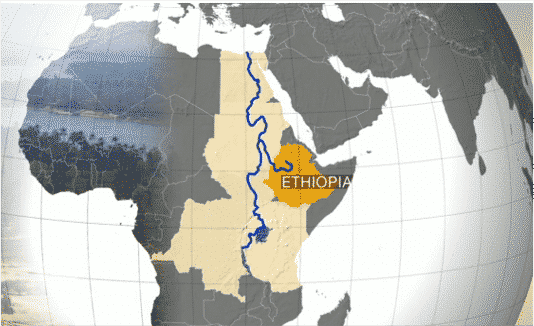The Ethiopian government began constructing the Grand Renaissance Dam in April 2011, expected to be the 8th largest in the world upon completion. According to reports, the dam is more than 40% complete. In undertaking this project, the Ethiopian government aims to benefit from the hydropower plant’s electricity production; not only does electricity production benefit Ethiopia domestically, but excess power can also be sold to surrounding countries such as Egypt and Sudan.
While obvious benefits may accompany an increase in power production in the underdeveloped region, possible threats are also extant with the construction of the project. Both Sudan and Egypt rely on the downstream flows of the Nile River. As a result of an agreement signed in 1959 by Sudan, Egypt and the United Kingdom, Egypt has had sole control over the Nile’s water resources and its allocation – despite the fact that the majority of the Nile’s water originates from its upstream sources in Ethiopia. The construction of the dam would consequently give Ethiopia greater control of the region’s water resources; thus, concerning an Egyptian government who has depended on its decades-long control of the River’s water.
Tensions between Ethiopia and Egypt peaked while Mohamed Morsi’s Muslim Brotherhood was in power in Egypt. Morsi’s government feared that Egypt’s most precious resource was at risk. While multiple studies have failed to produce a cohesive conclusion on the effects of the Dam’s completion, most experts are expecting at least a temporary reduction – spanned over several years — in the downstream flow of water to Egypt due to the filling of the dam. For a country whose demand for water is expected to increase in the future, and whose population is overwhelmingly settled along the Nile, severe consequences exist in the event that water supply is reduced. However, with the recent ouster of Morsi and Abdel Al-Sisi’s rise to power, Egyptian-Ethiopian relations have seemed to take a noteworthy turn.
On October 6, 2014 Ethiopian President, Mulaatu Teshome, said that major progress between the two nations was taking place with regard to the waters of the Nile River. President Teshome said his country would certainly reach an understanding with Egypt on the allocation and use of the Grand Renaissance Dam. A joint Egyptian-Ethiopian ministerial committee is due to convene on October 22, where the development of the Dam and its consequences will be discussed. The transformation of relations between the two countries has significant geopolitical significance: Former President Mohamed Morsi’s adamant objection to the construction of the dam seemed to suggest that another political, or possible military, conflict was brewing, but with the recent news of Egypt’s accommodation it seems that the construction of the Dam may now provide a source of stability and growth to the region. Ethiopia and its neighbors, including Egypt, could benefit from the electricity generated by the hydropower plant.
The completion of the Grand Renaissance Dam is expected in 2017. The future of the project remains somewhat uncertain as funding questions still remain and political hurdles have yet to be completely resolved. However, the recent news of a possible agreement between Egypt and Ethiopia seem to be a positive step forward toward much needed power production and regional stability.
http://www.centerforsecuritypolicy.org/


No comments:
Post a Comment